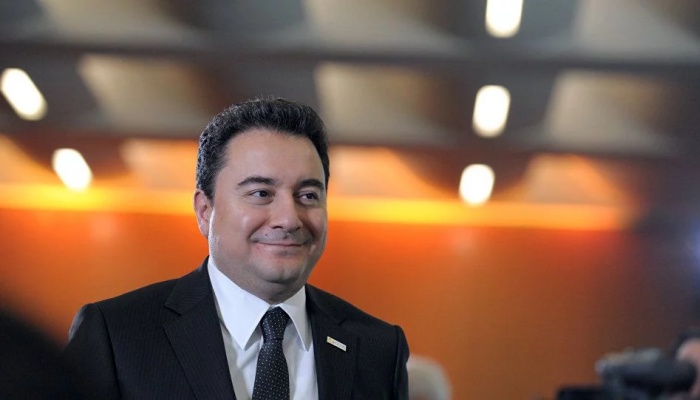Democracy and Progress Party (DEVA) leader Ali Babacan has said his party members are currently working on a new constitution as part of the party’s platform, which includes a return to a parliamentary democracy from Turkey’s current executive presidential system.
Babacan, a former minister and founding member of the ruling Justice and Development Party (AKP), resigned over “deep differences” about the direction of the party in July 2019 and launched his rival political party DEVA eight months later, in March.
“We’ve started working on a constitution that is based on the separation of powers and unity among government institutions,” Babacan told the Karar daily in an interview on Tuesday.
Babacan argued that Turkey will have to hold a snap election in 2021 or 2022 since the deteriorating political, social and economic conditions of the country will not allow waiting for June 2023, when the next general election is scheduled to be held.
He said opposition parties should plan for the period between the next election and the one after that in order to ensure a return to a parliamentary system of governance in Turkey.
“The next election will be based on the current constitution, a system with a president with sweeping powers and a weak parliament. Every party should work on concrete steps to take in the transition period between the next election and the one after that and announce them in order to define the transition [from the presidential to the parliamentary system].”
“If we don’t do that, the newly elected president might enjoy the new powers [too much] and delay the transition,” Babacan warned.
The DEVA leader criticized the AKP government, saying their only purpose is “to stay in power somehow.”
“They don’t care about whether something bad happened in the country or if feelings of a certain segment of society [are hurt]. It’s a shame, really. We are missing great opportunities, we’re wasting our potential, the potential of the young,” he added.
Babacan gave the example of a university student who had designed her own news website and told him she was afraid of being arrested “since even those who comment on social media posts [that are critical of President Recep Tayyip Erdoğan and his ruling AKP] are immediately arrested in Turkey.”
When asked about whether he thought the AKP could have been a source of fear in Turkey when he was part of it, Babacan said he didn’t but that it was unfortunately the case now.
“This is about the use of [political] power. It should be limited by law and time. Power corrupts politicians, and using it for a long time corrupts them even more. Absolute power corrupts absolutely.”
Regarding the situation of the Turkish lira, which hit a new record low last week, trading at 8.23 to the US dollar, Babacan described two bad scenarios, one of which he thinks will take place in the short term.
“Either they will not try to keep the exchange rate under control and it will find a new balance at a very low point that will trigger a huge wave of inflation, or the Turkish Central Bank will raise interest rates even more than before, causing further damage to the economy.”
Commenting on Erdoğan’s remarks last week, when he asked whether people believe that “anyone can’t bring home the bread” amid the decline of the Turkish lira, Babacan said that it is the reality of Turkey.
“There really are people in Turkey who cannot bring home the bread. Municipalities and social aid foundations used to step in and help people who were in need. Nowadays, they either have funding problems, or they’re no longer concerned about those people. The AKP’s organizations are a mess. There’s no party anymore, but rather people gathering around one person [Erdoğan].”
Babacan further said that economy-related problems cannot be solved in a country where the constitution and human rights and freedoms are being violated every day. “What we need is a holistic solution, a political revision that respects human rights, fundamental freedoms and judicial independence.”
The opposition leader also expressed concern regarding the Turkish government’s foreign policy, explaining that a huge, irreversible mistake in foreign policy could bring Turkey to the point of no return.
“They [government officials] have paid billions of dollars for the S-400 [air defense system] and don’t use it. They paid billions of dollars for F-35s [fighter jets] and can’t use them. What’s the result? They lose money, S-400s as well as F-35s. What’s the meaning of this? This policy has no consistency.”
The US government in July 2019 removed Turkey from its F-35 fighter jet program after the country began taking delivery of the S-400 air defense system from Russia, a country the US deems an adversary.
Washington also warned Ankara that it risks US sanctions under the Countering America’s Adversaries Through Sanctions Act (CAATSA) if the Russian advanced air defense system is activated.

